单元动词过去式
英语不规则动词过去式过去分词表

英语中有许多不规则动词,它们的过去式和过去分词形式与一般规律动词不同。
不规则动词过去式和过去分词形式的学习对于英语学习者来说往往是一项挑战。
本文将为您介绍一份包括常见不规则动词过去式和过去分词的表格,希望对您的学习有所帮助。
不规则动词过去式和过去分词表1. be- 过去式: was/were- 过去分词: been2. do- 过去式: did- 过去分词: done3. go- 过去式: went- 过去分词: gone4. have- 过去式: had- 过去分词: had5. eat- 过去式: ate- 过去分词: eaten6. drink- 过去式: drank- 过去分词: drunk7. break- 过去式: broke- 过去分词: broken8. bring- 过去式: brought - 过去分词: brought9. choose- 过去式: chose- 过去分词: chosen10. drive- 过去式: drove- 过去分词: driven11. run- 过去式: ran- 过去分词: run12. write- 过去式: wrote- 过去分词: written13. sing- 过去式: sang- 过去分词: sung14. swim- 过去式: swam- 过去分词: swum15. steal- 过去式: stole- 过去分词: stolen16. teach- 过去式: taught- 过去分词: taught17. think- 过去式: thought - 过去分词: thought18. hide- 过去式: hid- 过去分词: hidden19. shine- 过去式: shone- 过去分词: shone20. seek- 过去式: sought- 过去分词: sought21. lose- 过去式: lost- 过去分词: lost 22. make- 过去式: made- 过去分词: made23. feed- 过去式: fed- 过去分词: fed24. feel- 过去式: felt- 过去分词: felt25. keep- 过去式: kept- 过去分词: kept总结以上是一份包括常见不规则动词过去式和过去分词的表格,这些不规则动词的过去式和过去分词形式需要进行熟记和反复练习,以便在实际运用中能够准确无误地使用。
外研社一年级起点英语 四年级上册各单元知识点

外研社一年级起点英语四年级上册各单元知识点四上Module 1 知识点一、词汇:1. 单词:亲爱的dear 健康的well ……的of 很快,不久soon 告诉,讲述tell爱你的love2. 词组:read a letter读信 a photo of ……一张……的照片at the Great Wall在长城at Buckingham Palace在白金汉宫二、重点句:1.这是我的生日在星期六(过去时)It was my birthday on Saturday.2. 我们在白金汉宫。
(过去)We were at Buckingham Palace.3. 我有一个新朋友。
I’ve got a new friend.三、知识点:1. be动词变形:现在:is 单数are复数;过去:was单数were复数2. 主语+be+形容词:性格nice clever helpful quiet shy good外貌short tall fat thin beautiful3. 主语+ have/has got+ 形容词+名词“具体的外貌特征”四上Module 2 知识点一、词汇:1. 单词:短裙skirt 打扫,清理clean 脏的dirty 先生Mr 完成finish 绘画paint打电话phone2. 词组:wash my shirt洗我的衬衫cook noodles 做面条wash my skirt 洗我的裙子paint a picture画一幅画clean my room 打扫我的房间wash my trousers 洗我的裤子二、重点句:1.我帮助了我的妈妈。
I helped my mum.2.昨天我打扫了我的房间。
Yesterday, I cleaned my room.3.我洗了我的裤子。
I washed my trousers.4.Amy 画了一张画. Amy painted a picture.三、知识点:1. 表达“过去某人做某事” 主语+ 动词过去式+ 其他I cleaned my room. She washed her skirt.2. 动词变过去式,直接加edwash-washed clean-cleaned finish-finished help-helpedcook-cooked paint-painted watch-watched play-playedlisten-listened不发音的e结尾,直接加d phone-phoned四上Module 3 知识点一、词汇:1. 单词:不(过去式) didn’t=did not 国庆节National Day 停留stay多么what 无聊的,令人厌烦的boring 一天,白天day2. 词组:get up 起床ride a bike 骑自行车stay at home待在家里walk to school步行去上学have English上英语课二、重点句:1.昨天她没有走路去上学。
(完整版)八年级上册第一单元英语语法、短语和知识点总结

八年级上册英语语法、短语和知识点总结Unit 1 Where did you go on vacati on?本单元的话题:谈论假期活动内容,复习一般过去时。
本单元的语法:1.复习一般过去时;2•学习不定代词和不定副词的用法。
语法: 1•本单元出现的动词不规则过去式有:is\am---was 是;are -- were 是;go---went 去;buy —bought买;take ---took拿走;do\does —did 做;feed—fed喂;see —saw看见;eat --ate 吃;have\has —had 有、吃;feel -felt 感觉;ride —rode 骑;get --got 到达,得到;can — could 能、会;forget —forgot 忘记;drink —drank 喝;find —found 找到2. 不定代词和不定副词的用法:some bodyany oneevery thingno where (疑问副词)不定代词和不定副词(1)左边的some、any、every、no 与右边的body、one、thing 构成不定代词,some、any、every、no与右边的疑问副词where 构成不定副词;(2)—般情况下以some开头的不定代词和不定副词用于肯定句,以any开头的不定代词和不定副词用于否定句、疑问句;以no开头的不定代词和不定副词表示否定含义(no one为两个单词);(3)不定代词或不定副词和形容词连用时,形容词放在后面。
He has something important to do. 他有重要的事情要做。
(肯定句用something,形容词important 放后)Did you buy anything special?(一般疑问句用anything,形容词special放后)Did you go any where interesting last mon th? 上个月你去令人感兴趣的地方了吗?(一般疑问句用不定副词anywhere,形容词interesting 放后)(4)不定代词和不定副词做主语时,后面的动词用单数形式。
北京版六年级英语上册第三单元知识点

Unit 3 知识点Lesson 9一、动词原形及过去式(需背、默)do----did 做take----took 拿取miss----missed 错过go----went 去come----came 来fly----flew 飞find----found 寻找leave----left 离开,忘了带drive----drove 驾驶,开车二、重点词组(需背、默)1. take a trip ------ took a trip 旅行2. come back ------ came back 回来3. miss our flight------ missed our flight 错过了我们的航班4. go back ------ went back 回去5. last Sunday 上周日6. last weekend 上周末7. at the airport 在机场8. in the hotel 在旅馆9. on Monday 在周一10. angry 生气的三、重点句型(需背、默)1. ---- Where did you go last weekend? 上个周末你去哪儿了?---- We flew to Hangzhou. 我们飞去了杭州。
2. ---- Where did you go yesterday afternoon? 昨天下午你去哪儿了?---- We drove to Xiangtan. 我们开车去了香山。
3. ---- Where did you go on Friday morning?周五上午你去哪儿了?---- We took the train to Tianjin. 我们坐火车去了天津。
四、我会说How do you go to school?How did you go to Hangzhou?I go to school by bike. I went to Hangzhou by car.I was very happyI’m sorry to hear that. Your parents must be upset.Lesson 10一、动词及过去式(需背、默)buy—bought买am/is—was是are—were是go—went 去do—did 做visit—visited 参观see—saw 看见take—took 拿,获得feed—fed 喂养二、重点词组(需背、默)1. fantastic. 极好的2. go(went)there by air 坐飞机去那3. green hills 绿色的山4. the West Lake 西湖5. go(went)around 参观,走访6. sound special. 听起来很特别三、重点句型(需背、默)1.---- How did you go to Hangzhou? 你们怎么去杭州?---- We went there by air. 我们坐飞机去那儿。
新版外研版五年级上册英语M1-10单元归纳总复习

• 3.This man is blind.He can’t see.This dog helps him.这个男人是盲人,他看不见,这条狗帮助他。
• 4.This girl is deaf.She can’t hear. This dog helps her.这个女孩是聋子,她听不见,这条狗帮助她。
• this pair of shorts 这条短裤 • want sth 想要某个东西 • want to wear it 想穿它 • buy sth for sb 买某个东西给某人 • on the nine 在绳子上 • wash them for you 为你洗听他们 • lost my cap 丢了我的帽子 • find this bag 找到这个包 • on the shool bus 在校车上 • sports shoes 运动鞋 • Don‘t argue 不要争吵
carry the bag 拿包
节目
sit down 坐下
Last week 上个星期
this little girl 这个小女孩
have a dog 养一条狗
帮助很大 帮助他 一个关于狗的电视节目 拿包 坐下 上个星期 这个小女孩 养一条狗
• 1.They can help a lot .他们帮助很大。 • 2.There’s a TV show about dogs.有一个关于狗的
• forty • number • thirty • fifty • seventy • ninety • happily • sixty • many • eighty
• fifteen faces 十五张笑脸 • class begins 上课 • give out 分发 • all right 好的 • in the class 在教室里 • on the floor 在地板上 • have a party 举行晚会 • all of them 他们所有人 • dance happily 跳得高兴 • so many 许多
北京版六年级英语上册第一单元知识点总结

UNIT1知识点总结I just stayed in Beijing.我只是待在了北京。
I learned to sing Peking Opera and went swimming.我学习了唱京剧,还去游泳了。
I visited some museums and played with my cousins.我参观了一些博物馆,还和我的表哥表姐一起玩耍。
LESSON2I went to my summer camp.我去夏令营了。
I came back last Thursday.我上周四回来的。
I climbed the mountains and swam in the river.我爬山了,还在河里游泳了。
I went fishing and caught three fish.我去钓鱼了,还钓上了三条鱼。
I let them go back into the river again.我让它们又回到小河里了。
I had a lot of fun.我玩得很开心。
I had a great time.我玩得很开心。
I had an interesting vacation.我度过了一个有意思的假期。
LESSON3I went to see my grandparents.我去看望了我的爷爷奶奶。
I gave them some gifts.我送了他们一些礼物。
I bought a pair of shoes for my grandma.我给我的奶奶买了一双鞋。
I bought a pair of glasses for my grandpa.我给我的爷爷买了一副眼镜。
They liked them very much.他们非常喜欢。
They are coming to visit me next summer.他们明年夏天将要来北京看望我。
I want them to enjoy the best food here.我想要他们享用这里最好的美食。
译林版(三起)六年级上册英语各单元知识点归纳
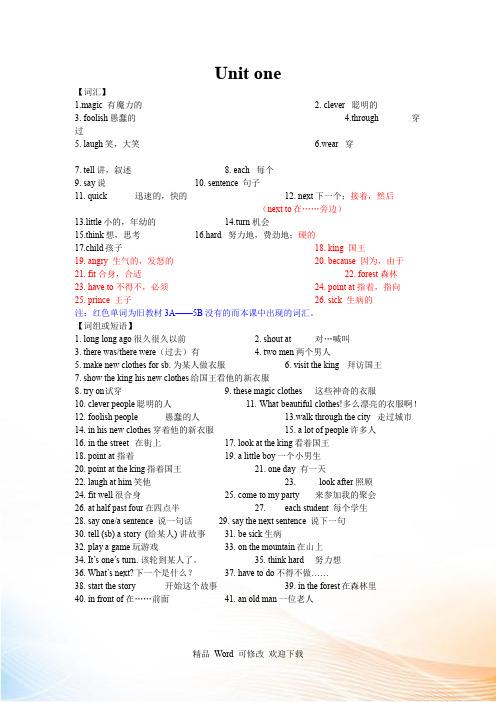
Unit one【词汇】1.magic 有魔力的2. clever 聪明的3. foolish愚蠢的4.through穿过5. laugh笑,大笑6.wear 穿7. tell讲,叙述8. each 每个9. say说10. sentence 句子11. quick迅速的,快的12. next 下一个;接着,然后(next to在……旁边)13.little小的,年幼的14.turn 机会15.think想,思考16.hard 努力地,费劲地;硬的17.child孩子18. king 国王19. angry 生气的,发怒的20. because 因为,由于21. fit 合身,合适22. forest 森林23. have to 不得不,必须24. point at 指着,指向25. prince 王子26. sick 生病的注:红色单词为旧教材3A——5B没有的而本课中出现的词汇。
【词组或短语】1. long long ago很久很久以前2. shout at对…喊叫3. there was/there were(过去)有4. two men两个男人5. make new clothes for sb. 为某人做衣服6. visit the king拜访国王7. show the king his new clothes给国王看他的新衣服8. try on试穿9. these magic clothes这些神奇的衣服10. clever people聪明的人11. What beautiful clothes!多么漂亮的衣服啊!12. foolish people愚蠢的人13.walk through the city走过城市14. in his new clothes穿着他的新衣服15. a lot of people许多人16. in the street在街上17. look at the king看着国王18. point at 指着19. a little boy一个小男生20. point at the king指着国王21. one day 有一天22. laugh at him笑他23. look after 照顾24. fit well很合身25. come to my party来参加我的聚会26. at half past four在四点半27.each student 每个学生28. say one/a sentence 说一句话 29. say the next sentence 说下一句30. tell (sb) a story (给某人) 讲故事31. be sick生病32. play a game玩游戏33. on the mountain在山上34. It’s one’s turn. 该轮到某人了。
北京版六年级英语上册第三单元知识点总结

UNIT3知识点总结We took a trip to Hangzhou.我们去杭州旅行了。
It was fantastic.这次旅行很美妙。
We went there by air.我们坐飞机去的。
We visited many places.我们游览了很多地方。
We saw green hills,blue water,small bridges and old houses.我们看到了青山、绿水、小桥、老房子。
We went around the West Lake by bike.我们骑车环绕了西湖。
My mum bought some silk dresses.我的妈妈买了一些真丝连衣裙。
My dad bought some green tea.我的爸爸买了一些绿茶。
LESSON9My parents and I took a trip last weekend.我和我的父母上周末去旅行了。
We flew to Hangzhou.我们坐飞机去了杭州。
We missed our flight and came back late.我们误了航班,回来晚了。
It was last Sunday afternoon at the airport.事情就在上周日下午,在机场。
I found I left my passport at the hotel.我发现我把我的护照落在了酒店。
We went back for it,and then we missed the flight.我们为此回去了,然后我们就误了航班。
My parents were angry.我的父母很生气。
They missed work and I missed school.他们误了上班,我误了上学。
LESSON11Many years ago,people walked or rode horses.很多年以前,人们走路、骑马。
八年级上册英语课堂笔记(1-6单元)
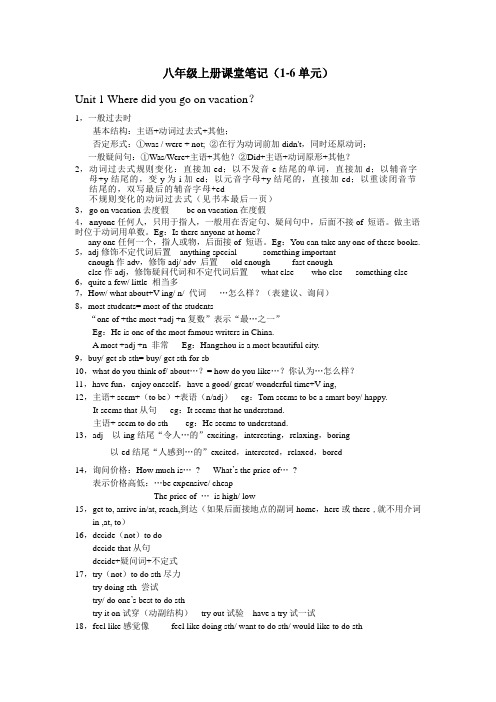
八年级上册课堂笔记(1-6单元)Unit 1 Where did you go on vacation?1,一般过去时基本结构:主语+动词过去式+其他;否定形式:①was / were + not; ②在行为动词前加didn't,同时还原动词;一般疑问句:①Was/Were+主语+其他?②Did+主语+动词原形+其他?2,动词过去式规则变化:直接加ed;以不发音e结尾的单词,直接加d;以辅音字母+y结尾的,变y为i加ed;以元音字母+y结尾的,直接加ed;以重读闭音节结尾的,双写最后的辅音字母+ed不规则变化的动词过去式(见书本最后一页)3,go on vacation去度假be on vacation在度假4,a nyone任何人,只用于指人,一般用在否定句、疑问句中,后面不接of 短语。
做主语时位于动词用单数。
Eg:Is there anyone at home?any one任何一个,指人或物,后面接of 短语。
Eg:You can take any one of these books. 5,adj修饰不定代词后置anything special something importantenough作adv,修饰adj/ adv 后置old enough fast enoughelse作adj,修饰疑问代词和不定代词后置what else who else something else 6,quite a few/ little 相当多7,How/ what about+V-ing/ n/ 代词…怎么样?(表建议、询问)8,most students= most of the students“one of +the most +adj +n复数”表示“最…之一”Eg:He is one of the most famous writers in China.A most +adj +n 非常Eg:Hangzhou is a most beautiful city.9,buy/ get sb sth= buy/ get sth for sb10,what do you think of/ about…?= how do you like…?你认为…怎么样?11,have fun,enjoy oneself,have a good/ great/ wonderful time+V-ing,12,主语+ seem+(to be)+表语(n/adj)eg:Tom seems to be a smart boy/ happy.It seems that从句eg:It seems that he understand.主语+ seem to do sth eg:He seems to understand.13,adj 以-ing结尾“令人…的”exciting,interesting,relaxing,boring以-ed结尾“人感到…的”excited,interested,relaxed,bored14,询问价格:How much is…? What’s the price of…?表示价格高低:…be expensive/ cheapThe price of …is high/ low15,get to, arrive in/at, reach,到达(如果后面接地点的副词home,here或there,就不用介词in ,at, to)16,decide(not)to dodecide that从句decide+疑问词+不定式17,try(not)to do sth尽力try doing sth 尝试try/ do one’s best to do sthtry it on试穿(动副结构)try out试验have a try试一试18,feel like感觉像feel like doing sth/ want to do sth/ would like to do sth19,a lot of= lots of =plenty of20,in the past在过去21,enjoy/ like doing22,感叹句:How+adj+主谓!How+adj+a/an +n单+主谓!What+ a/an +adj+ n单+主谓!What+ adj+ n复/ 不可数+主谓!23,more than=over超过less than 少于more or less或多或少24,wait for等待25,too many“太多”修饰可数名词复数too much“太多”修饰不可数名词much too“实在太”修饰形容词或副词26,because+从句because of +n/ V-ing /代词27,enough作adj修饰n,enough time enough moneyhave enough…to do sth eg:I have enough time to finish the work.enough作adv修饰adj/ adv old enough fast enough…enough for sb to do sth eg:The job is easy enough for me to do.not…enough to do The book isn’t easy enough for me to read.too…to…The book is too difficult for me to read.so…that…The book is so difficult that I can’t read.28,the next day第二天29,remember/ forget+to do要做+doing做过30,Stop sb from doing sth阻止Stop to do 停下来去做其他事Stop doing 停止正在做的事31,another two hours=two more hours32,at the top of在…顶端,名列…之前强调点on the top of在…上面强调面33,find out查明,弄清find找到(结果)look for寻找(过程)34,go on with/ doing sth继续原来的事go on to do sth继续做别的事35,so +adj +that +结果状语从句“如此……以致……”eg:I was so busy that I didn’t go to sleep for 3 days.so that 引导目的状语从句,以便,为了(in order to)eg:they got up early so that they could catch the early bus.so +adj +(a/ an+n单数)that It is so important a meeting that I can’t miss it.such+ a/ an+ adj + n单数+that It is such an important meeting that I can’t miss it.such+ adj+n复数/不可数+thatUnit 2 How often do you exercise?1,How如何(方式)how long多长(时间)答语常用“(For/ about +)时间段”how far多远(距离)答语常用“(It’s +)数词 +miles/ meters/ kilometers”how often多久一次(频率)答语常用“Always/ often/ every day/…”或“次数+时间”等表频率的状语How soon多快,多久以后,常用在将来时中。
北京版六年级英语上册第二单元知识点总结
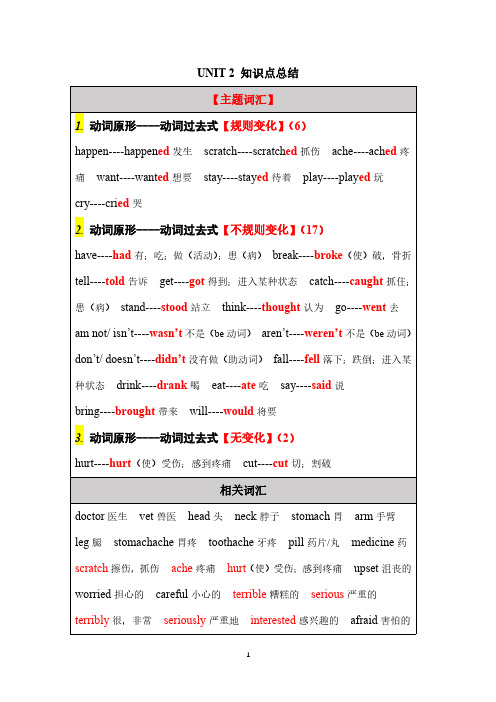
UNIT2知识点总结LESSON7I have a stomachache.我胃疼。
I ate too much for lunch.我午饭吃了太多。
I drank a big bowl of soup.我喝了一大碗汤。
I had some rice with fish and vegetables.我吃了一些米饭,还有鱼肉和蔬菜。
I had a big piece of chocolate cake and some honey cookies.我吃了一大块巧克力蛋糕和一些蜂蜜曲奇。
There was no need to give me some medicine.不需要给我开药。
I should take a long walk and not have supper.我应该多散步,别吃晚饭。
I should stop eat ing too much and exercise more.我应该少吃一些,多锻炼。
【功能句型】What happened to you?你怎么了?What’s wrong with you?你怎么了?What’s the matter with you?你怎么了?I broke my arm.我摔断了我的胳膊。
I hurt my right leg.我弄伤了我的右腿。
My cat scratched me.我的猫抓伤了我。
Why did you stand on your head?你为什么倒立?Because I wanted to practice kung fu.因为我想要练习功夫。
Why did you cry?你为什么哭了?Because I fell.因为我摔倒了。
六年级英语下册人教pep版小学英语 单元重点知识 动词过去式表格

4.It’s taller than both of us together.
它比我们两个加起来都高。
5.There are more dinosaurs over there!
那儿有更多的恐龙!
P5
6.old-older
7.young-younger
(更)年长的
(更)年轻的
8.tall-taller
在中国我穿38码的鞋子.
18.Your feet are bigger than me.
你的脚比我的大。
19.You look taller than me.
你看起来比我高。
20.-How heavy are you?
-I’m 48 kilograms.
-你有多重?
-我48公斤。
P7
21.small-smaller
你也比我年长。
P6
15.Those shoes in the window are nice.
那些在窗户里的鞋子真好看!
16.-What size are your shoes?
-My shoes are size 7.
-你鞋子几码?
-我鞋子7码。
17.In China I wear size 38 shoes.
草
…年前
10….months ago
st year/month
…个月后
去年/上个月
12.There was nogym in my school
twenty years ago.
二十年前我的学校里没有体育馆。
13.In the Tang dynasty,there were no gyms.
海南离这儿很远。
北京版六年级英语上册第五单元知识点

Unit 5 知识点Lesson 15一、动词原形及过去式(需背、默)do—did做begin—began开始learn—learned学习think—thought想/认为have/has—had有are—were是take—took带isn’t—wasn’t不是hold—held举办go—went去can—could 能/能够二、重点词组(需背、默)1.the ancient Olympic Games古代奥运2.the modern Olympics Games现代奥运会3. be different from 不同于4. all over the country 遍及全国5. take part in 参加6. history 历史7. those 那些8. PE 体育三、重点句型(需背、默)1.---- When did the ancient Olympic Games begin? 古代奥运会什么时候开始的---- They began in 776 BC. 古代奥运会开始于公元前776年。
2.---- When did the Qin Dynasty begin? 秦朝是什么时候开始的?---- It began in 221 BC. 秦朝开始于公元前221年。
3.---- When did the Tang Dynasty begin? 唐朝什么时候开始的?---- It began in 618 AD. 唐朝开始于公元618年。
四、我会说The ancient Olympic Games began in 776 BC, about 3000 years ago. It had a history of 3000 years. The first Olympic Games were held in Olympia, a city of Greece. There were no women in the ancient Olympic Games. Only men could take part.Lesson 16一、动词及过去式(需背、默)stop—stopped 停止hold—held 举行do—did做二、重点词组(需背、默)1. a long time ago 很久以前2. What a shame! 好遗憾呀!3. the capital city of Greece 希腊的首都4. take part in 参加5. each other 互相6. Higher, Faster, Stronger 更高,更快,更强7. the motto of the modern Olympics现代奥运会的主题8. ore events 更多事件三、重点句型(需背、默)1.---- When did people hold the first modern Olympics?人们什么时候举行了第一届现代奥运会?---- They held them in 1896 in Athens. 1896年他们在希腊举行的。
八年级上册英语第一单元和第二单元中的语法

八年级上册英语第一单元和第二单元中的语
法
第一单元中的语法主要包括:
1.一般现在时:用于陈述客观事实、经常性行为或习惯动作。
如:
I play tennis every Sunday.
2.现在进行时:表示现阶段正在进行的动作。
如:She is
reading a book now.
3.句型:There be句型,用来表达某处存在某物。
如:There is
a pen on the desk.
4.数词的用法:用于描述数量。
如:two hundred, one million。
5.疑问句的结构:用来询问信息或确认某事情。
如:Where is
your bag?
第二单元中的语法主要包括:
1. be动词的过去式:用于表示过去发生的动作或状态。
如:He was a teacher before.
2.一般过去时:用于叙述过去发生的动作或状态。
如:I went to the park yesterday.
3.一般将来时:用于表示将来要发生的动作或存在的状态。
如:She will come back later.
4. be going to结构:表示将要做某事的计划或打算。
如:They are going to have a picnic tomorrow.
5.从句:用于描述原因、目的、结果等。
如:He ran fast because he was late.。
八年级上册第一单元英语语法 、短语和知识点总结
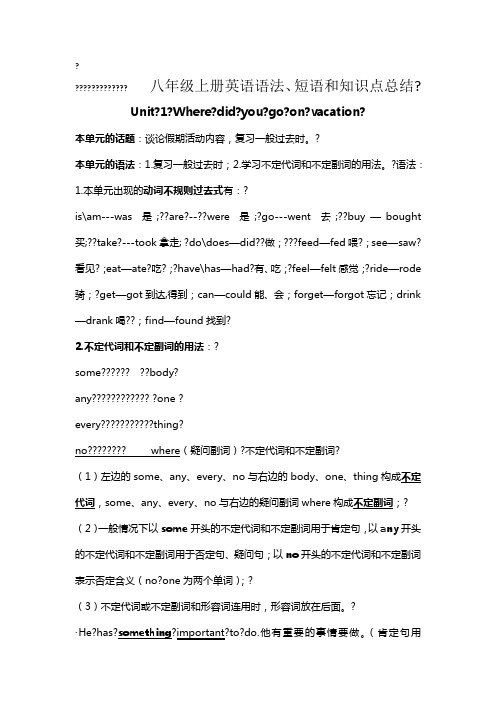
?????????????? 八年级上册英语语法、短语和知识点总结?Unit?1?Where?did?you?go?on?vacation?本单元的话题:谈论假期活动内容,复习一般过去时。
?本单元的语法:1.复习一般过去时;2.学习不定代词和不定副词的用法。
?语法:1.本单元出现的动词不规则过去式有:?is\am---was是;??are?--??were是;?go---went去;??buy—bought 买;??take?---took拿走; ?do\does—did??做;???feed—fed喂?;see—saw?看见?;eat—ate?吃?;?have\has—had?有、吃;?feel—felt感觉;?ride—rode 骑;?get—got到达,得到;can—could能、会;forget—forgot忘记;drink —drank喝??;find—found找到?2.不定代词和不定副词的用法:?some?????? ??body?any???????????? ?one ?every???????????thing?no???????? where(疑问副词)?不定代词和不定副词?(1)左边的some、any、every、no与右边的body、one、thing构成不定代词,some、any、every、no与右边的疑问副词where构成不定副词;? (2)一般情况下以some开头的不定代词和不定副词用于肯定句,以any开头的不定代词和不定副词用于否定句、疑问句;以no开头的不定代词和不定副词表示否定含义(no?one为两个单词);?(3)不定代词或不定副词和形容词连用时,形容词放在后面。
?·He?has?something?important?to?do.他有重要的事情要做。
(肯定句用something,形容词important放后)?????·Did?you?buy?anything?special??(一般疑问句用anything,形容词special 放后)?·Did?you?go?anywhere?interesting?last?month?上个月你去令人感兴趣的地方了吗???(一般疑问句用不定副词anywhere,形容词interesting放后)? (4)不定代词和不定副词做主语时,后面的动词用单数形式。
六年级英语第三单元过去式讲解和练习
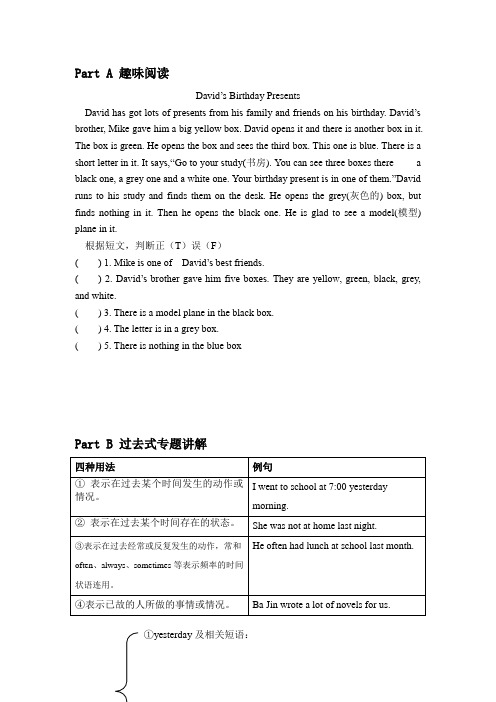
Part A 趣味阅读David’s Birthday PresentsDavid has got lots of presents from his family and friends on his birthday. David’s brother, Mike gave him a big yellow box. David opens it and there is another box in it. The box is green. He opens the box and sees the third box. This one is blue. There is a short letter in it. It says,“Go to your study(书房). You can see three boxes there____ a black one, a grey one and a white one. Your birthday present is in one of them.”David runs to his study and finds them on the desk. He opens the grey(灰色的) box, but finds nothing in it. Then he opens the black one. He is glad to see a model(模型) plane in it.根据短文,判断正(T)误(F)( ) 1. Mike is one of David’s best friends.( ) 2. David’s brother gave him five boxes. They are yellow, green, black, grey, and white.( ) 3. There is a model plane in the black box.( ) 4. The letter is in a grey box.( ) 5. There is nothing in the blue boxPart B 过去式专题讲解①yesterday及相关短语:②“last+ 时间状语”构成的短语:时间状语4种③“一段时间+ago”组成的短语:④“介词+ 时间名词”组成的短语:动词的过去式was、She was ateacher five years ago.例句+动Jenny bought a skirt yesterday.主语Jenny didn’t buy a skirt yesterday.句式Part C 过去式专题演练一、找出画线部分读音不同的单词( ) 1. A. tea B. meat C. weather D. beach( ) 2. A. back B. fast C. have D. map( ) 3. A. warm B. garden C. market D. party( ) 4. A. school B. tooth C. choose D. good( ) 5. A. book B. moody C. look D. cook二、写出下列单词的过去式watch________ wash _________ clean ________ cook play _______ visit ______ do ______ studygo ______ read _______ am/is_____ swim have______ fly______ are return三、英汉互译1、上周末6、wash clothes2、去游泳_ _ 7、visit grandparents3、去钓鱼8、listen to music4、去郊游9、play football5、看电视10、go to the park四、根据句意和已给出的首字母,补全单词1、He w to a park yesterday.2、I c my room last weekend.3、Did you r the magazine?4、Did Lucy c a mountain5、Last Saturday ,Candy v her uncle.6. What did you d_____ last weekend ?7. She r______ a book last night .8. He went s________ yesterday .9. Amy l_________ to music last Tuesday .10. We w________ fishing yesterday .11. Last Sunday ,I climbed m with father.五、用所给词的适当形式填空1.That is not___kite.That kite is very small,but____is very big. (I)2.The dress is____.Give it to ____. (she)3.Is this____watch?(you)No,it's not____. (I)4.___is my brother.___name is Jack.Look!Those stamps are____. (he)5.Here are many dolls,which one is ___ (she)六、选择题()1、-Did you help me clean my room ? -Yes , I .A、didB、doC、does( )2 -What did Lisa do yesterday? -She to music .A、listensB、listenC、listened( )3、-What did you do last weekend? -I TV.A、sawB、looked atC、watched( )4、He into the lake and to it.A、jumped,swimedB、jump, swamC、jumped,swam ( )5、Did John football yesterday?A、playB、playedC、plaied ( )6、They books last weekend .A、readB、readedC、look( )7、Did you play football Zhang Peng?A、withB、andC、to( )8、Tom busy yeaterday.A、didB、wasC、were( )9、Lisa usually her homework after super.A、doesB、doC、did( )10、Did you swimming last weekend?A、goB、goesC、went( ) 11. What ____ he _____ yesterday ?A. does, doB. do , didC. did, do( ) 12. _____ he _____ football last weekend ?A. Did, playedB. Did, playC. Did, plays( ) 13. She _______ yesterday.A. went fishB.went fishingC. goes fishing( ) 14. He _________ the clothes yesterday.A.didn’t washedB. didn’t washC. don’t washed( ) 15. They _______ English last night.A.study B. studyed C. studied ( ) 16. It ______ a windy day yesterday . A.is B. was C.am()17.What___Wu yifan do Last weekend. A.do B.did C.does()18.I ___to a park yesterday. A.went B.go C.goes()19.I___my room last weekend. A.clean B.cleans C.cleaned()20.Lisa usually___her homework after super. A.does B.do C.did()21.Did you____swimming last weekend? A.go B.went C.do七、按要求完成句子1、I played football last Thursday. (对划线部分提问)2、They played sports just now..(改为一般疑问句)3、Linda helped her anut clean the room. (对划线部分提问)4、My brother goes to school by bike.(对划线部分提问)5、Mike went shopping with his mother yesterday. (改为一般疑问句)八、读下列短文,选择正确答案Today was hot. I wentto the farm with my parents. There was a river near the farm.I went to the river with my dog. We ran and played. Suddenly I dropped into the river, “Help, help...” My dog jumped into the river and swm to me, ten minutes later, I was saved. I was grateful to him. We are good friends.( )1、It was very _________.A、coldB、hotC、windy( )2、I went to the farm with my_________.A、parentsB、friendsC、teacher( )3、I ran and played with_________.A、my catB、my dogC、my sister( )4、_________jumped into the river and saved me.A、My dogB、My motherC、My father( )5、I was very grateful to my_________.A、motherB、friendC、dog九、读短文,判断对T,错FYesterday I had morning tea with my friend Tom in a restaurant . He is fat . He likes to eat very much. We had a happy time . The waiter brought us a lot of things. After a big meal , we had bananas and apples . He drank milk and coffee. I said ,“I think we have go now ,Tom. We have been here for 3 hours.”But he said ,“No,Mike.We shouldn’t leave now . It’s lunch time.”( ) 1. Tom and Mike had tea in the bookshop.( ) 2. They had fruits after meal.( ) 3. The meal they had in the morning was lunch .( ) 4. Tom wanted to have lunch because he was hungry.( ) 5. Tom and mike are friends.。
八年级上册英语语法第一单元
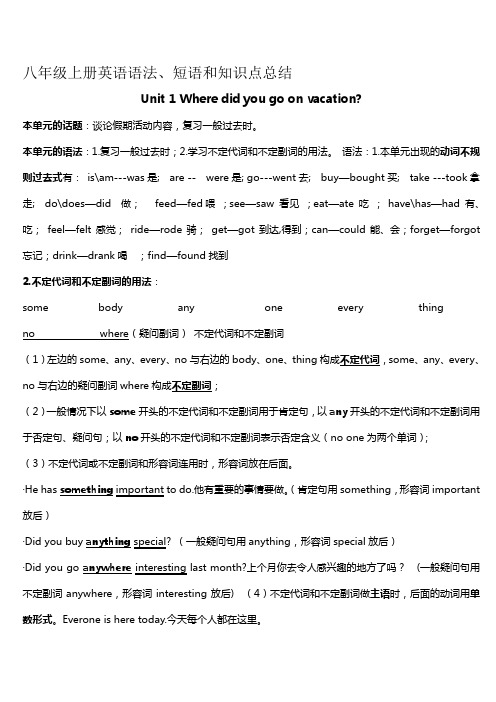
八年级上册英语语法、短语和知识点总结Unit 1 Where did you go on vacation?本单元的话题:谈论假期活动内容,复习一般过去时。
本单元的语法:1.复习一般过去时;2.学习不定代词和不定副词的用法。
语法:1.本单元出现的动词不规则过去式有:is\am---was是; are -- were是; go---went去; buy—bought买; take ---took拿走; do\does—did 做;feed—fed喂;see—saw 看见;eat—ate 吃;have\has—had 有、吃;feel—felt感觉;ride—rode骑;get—got到达,得到;can—could能、会;forget—forgot 忘记;drink—drank喝;find—found找到2.不定代词和不定副词的用法:some body any one every thingno where(疑问副词)不定代词和不定副词(1)左边的some、any、every、no与右边的body、one、thing构成不定代词,some、any、every、no与右边的疑问副词where构成不定副词;(2)一般情况下以some开头的不定代词和不定副词用于肯定句,以any开头的不定代词和不定副词用于否定句、疑问句;以no开头的不定代词和不定副词表示否定含义(no one为两个单词);(3)不定代词或不定副词和形容词连用时,形容词放在后面。
·He has something important to do.他有重要的事情要做。
(肯定句用something,形容词important 放后)·Did you buy anything special? (一般疑问句用anything,形容词special放后)·Did you go anywhere interesting last month?上个月你去令人感兴趣的地方了吗?(一般疑问句用不定副词anywhere,形容词interesting放后) (4)不定代词和不定副词做主语时,后面的动词用单数形式。
六年级上册1--3单元重点内容整理

Unit 1 In ChinaI重点词汇:1.动词过去式:see—saw do—did go—went get—got come--came am/is—was eat—ate have—hadtell—told; say—said run—ran 2.形容词比较级,最高级:cheap—cheaper—cheapest big—bigger—biggest large—larger—largest high—higher—highest heavy—heavier—heaviest tall—taller—tallest3.名词复数:peach--peaches butterfly—butterflies monkey—monkeys knife—knives city—cities country—countries leaf--leaves tomato—tomatoes potato—potatoes kangaroo--kangaroos4.动词单三形式:fly—flies have—has do—does study--studiesII.重点短语1.summer vacation 暑假2.winter vacation 寒假3.be famous for 因…而著名4.by train 乘火车5.by plane 乘飞机6.in the west of China 在中国的西面7.look at 看8.in East Asia 在东亚9.world-famous w闻名于世的10. the City God Temple城隍庙11.be afraid of 害怕…12. West Lake 西湖III.重点句型:1.Where did you go on your summer vacation?--I went to Guangzhou with my parents.2.What did you do there?--we ate seafood, had morning tea and tasted soup.3.Where is Xining?--It’s in the west of China.4.What’s Xining famous for?-- It’s famous for temples.5.How was your summer vacation?--It was great.6.What’s the weather like there?--It’s cool in summer.IV.话题作文(描写一座著名的城市)BeijingBeijing is the capital of China. It is in the north of China. Beijing is famous for its culture and its food. Peking Opera is world-famous. There are many kinds of local food in Beijing .Beijing duck is the most famous one. You can also visit the Great Wall, the Summer Palace and Tian’an men square.Unit 2 Around the WorldI重点短语1.in the middle of在…的中部2.Eiffel Tower 埃菲尔铁塔3.Louvre 卢浮宫4.more than 多于,超过5.Spring Festival 春节6.the Opera House 歌剧院7.maple leaves 枫叶8.the White House 白宫9.the Big Ben 大本钟10.the CN Tower 加拿大国家电视塔II.重点句型1.Where do you want to go this winter vacation?--I want to go to London. It’s in the southeast of the UK.2. What do you want to do there/--I want to visit the British Museum and see Big Ben. It’s a large clock.3.What do you know about Canada?--Canada is a big country. It’s famous for maple leaves.4. What language do people speak there?--People there speak English and French.5. What country is this? --It’s Canada.6.What can you do there?--I can visit the CN Tower and take photosIII.话题作文(描写一个熟悉的国家)The UKThe UK is a small but beautiful country. It’s famous for the British Museum and the Big Ben. People there speak English. London is a very beautiful city. It’s in the southeast of the UK. You can visit the London Eye there and take beautiful photos there.Unit 3. Animal WorldI重点词汇1.climb trees 爬树2.like to do sth/ like doing sth喜欢做某事3.run very fast跑得特别快4. swim very well游得特别好5.spend some time doing sth花费时间做某事6.look like看起来像7.of course 当然8.live in Jinchang生活在在金昌9.pick up捡起10.every night每天晚上11.be covered with 被..覆盖y eggs 下蛋;产卵13.look after 照顾14.an animal keeper动物饲养员15.lose sight 失明16.decide to do sth决定做某事17.cross the street 过马路18.turn left/ right左转/右转19.run out of the classroom跑出教室20.push away推开II.重点句型:1.What animals do you like?--I like butterflies. They are insects. They can fly, and they are beautiful.2. Do you like animals?—Yes, I do. / No, I don’t3.What are your favourite animals?--My favourite animals are monkeys.4.I like butterflies very much.5.What kind of animals are whales?--They are mammals.6. Penguins are bird. Sharks are fish.7.What can they do? –They can run very fast.8.What do they like to eat?--They like to eat peaches and bananas.9.What do they look like?--They are big and strong.III. 话题作文(描述一种自己最喜欢的动物)My Favourite AnimalMy favourite animals are rabbits. They are mammals. They each have two long ears and two red eyes. They can jump, and they eat grass. They are very lovely and cute. I like them very much.。
